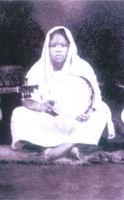Siti binti Saad facts for kids
Quick facts for kids
Siti binti Saad
|
|
|---|---|
 |
|
| Background information | |
| Born | c. 1880 Fumba, Mjini Mgaharibi Region, Tanzania |
| Died | August 1950 (aged 69–70) |
| Genres | Taarab |
| Labels | Columbia Records |
| Associated acts | Nadi Ikhwani Safa |
Siti binti Saad (born around 1880, died 1950) was a very important singer from Tanzania. She was a pioneer in a type of music called taarab. She was the first singer from East Africa to record her music. She made more than 150 recordings!
Siti also added a new dance style to taarab music called natiki. It was inspired by Indian dances. At a time when mostly men sang this music, Siti was one of the first women to become a famous taarab singer. Most singers before her sang in Arabic, but Siti also sang in Swahili. This made her music popular with more people. She performed in cities along the coast of Tanganyika and Zanzibar.
Her most famous period was from 1928 to 1939. She continued to sing until she died in 1950. After she passed away, more women started singing in music groups that used to be only for men. Taarab music also began to be sung mostly in Swahili instead of Arabic.
Early Life and Talent
Siti binti Saad was born in a village called Fumba, Zanzibar. This was around the year 1880. When she was a child, people knew her by the nickname 'Mtumwa'. This means 'slave' in Swahili. It was a custom back then to give children nicknames like this.
Her father, Saadi, was from the Nyamwezi tribe. Her mother was from the Zigua tribe. Both of her parents were born in Zanzibar. They came from very poor families. They worked in farming and made pottery. Siti's parents hoped she would learn to make pottery like her mother. But Siti found it hard to master. However, she helped by taking her mother's pots to town to sell.
Siti had a special gift for singing. She used her voice to help sell her mother's pottery. Her singing could be heard from far away. It let people know that Mtumwa's pottery was for sale that day. People said Siti had a very strong voice, like a lion's roar.
Becoming a Taarab Star
In those days, girls often did not go to school. Siti did not get a chance to go to school or study the Quran. So, she decided to move to the city to find a better life. She was lucky to meet Ali Muhsin. He was a member of a taarab group called Nadi Ikhwani Safa.
Nadi Ikhwani Safa was the only taarab group at that time. It was started by Sultan Barghash bin Said of Zanzibar. The Sultan loved comfort and fancy things. This group was only for men. It was not considered proper for women to join music groups. Lord Muhsin offered to teach Siti how to sing. He also taught her about musical instruments and Arabic.
He then introduced her to the other members of Nadi Ikhwani Safa. They quickly started to arrange performances for her. They received many invitations. The Sultan and other rich people often invited them. They also performed at weddings and other celebrations. Around this time, she started using the name 'Siti'. This name means both "lady" and "flute" or "whistle".
Fame and Legacy
As time passed, Siti's fame grew. In 1928, two big record companies, Columbia Records and His Master's Voice, heard about her. They invited Siti and her group to record music in Mumbai, India. Her music became popular right away in both India and Zanzibar. When she returned to Zanzibar, many people came out to welcome her.
Most records at that time sold only about 800 to 900 copies. But by mid-1931, Siti's records had sold 72,000 copies! Her huge popularity led to a recording studio being built in Zanzibar.
Siti recorded songs in Arabic, but her Swahili songs were the most loved. Only richer people could afford to buy records. But her music became popular among all kinds of East Africans. Her records helped make taarab music available to everyone.
Siti continued her music until she was old. Before she died, she met a famous writer named Shaaban Robert. He interviewed her to write her life story. He called the book Wasifu wa Siti binti Saad. This book is considered one of Tanzania's greatest literary works. It is still taught in secondary schools in Tanzania today.
Siti binti Saad passed away on July 8, 1950. She left a big empty space in the world of taarab music. Many people still sing in her style. A famous singer named Bi Kidude continued to sing in Siti's style until her own death in 2013.
Siti binti Saad came from a poor background. She used taarab music to speak up for social justice in what is now Tanzania. She spoke out against unfairness. For example, her song "The Police have Stopped" criticized a judge. This judge had let a rich man go free after he harmed his wife. Siti seemed brave and unafraid, even of the Sultan.
Even after her death, Siti's name is still used as a symbol of bravery. The Association of Women Journalists Tanzania (TAMWA) named their newspaper Voice of the Siti. To this day, Siti is seen as a role model for teaching taarab music.
See also
 In Spanish: Siti binti Saad para niños
In Spanish: Siti binti Saad para niños
 | Jackie Robinson |
 | Jack Johnson |
 | Althea Gibson |
 | Arthur Ashe |
 | Muhammad Ali |

